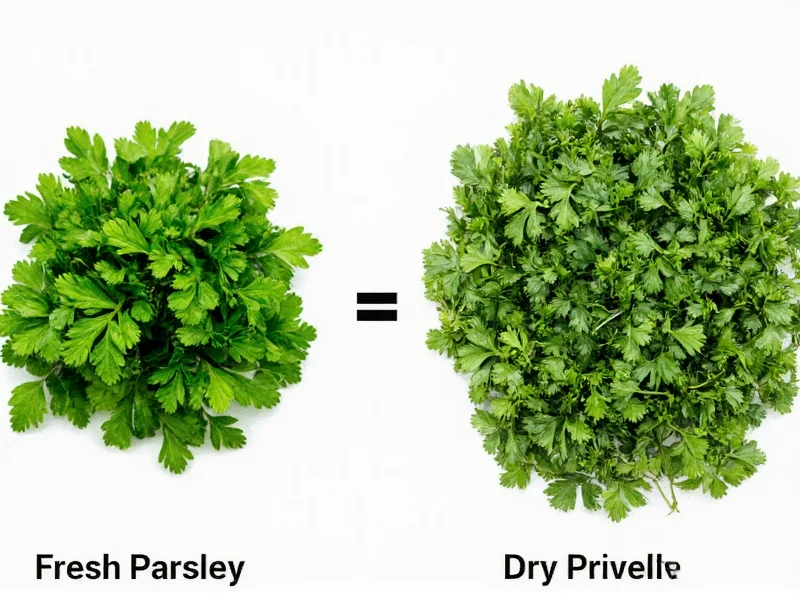One tablespoon of fresh parsley equals one teaspoon of dried parsley. This 3:1 ratio (fresh to dried) applies because drying concentrates the herb's flavor by removing moisture content.
Understanding Fresh to Dried Parsley Conversion
When following recipes, knowing how to convert between fresh and dried parsley is essential for achieving the right flavor balance. The standard conversion ratio exists because the drying process removes water content, concentrating the herb's essential oils and flavors.
The Science Behind the Conversion Ratio
Fresh parsley contains approximately 85-90% water. When dried, this moisture evaporates, leaving behind a more potent herb. Culinary experts generally agree that dried herbs are 2-3 times stronger than their fresh counterparts. For parsley specifically, the 3:1 ratio provides the most consistent results in cooking.
Fresh Parsley to Dried Parsley Conversion Chart
| Fresh Parsley | Dried Parsley | Best For |
|---|---|---|
| 1 cup chopped | ⅓ cup | Soups, stews, sauces|
| ½ cup chopped | 3 tablespoons | Marinades, dressings|
| ¼ cup chopped | 1½ tablespoons | Casseroles, roasted vegetables|
| 2 tablespoons | 2 teaspoons | Egg dishes, light sauces|
| 1 tablespoon | 1 teaspoon | Finishing dishes, garnishes
Practical Cooking Applications
Understanding fresh parsley to dry parsley conversion ensures your dishes maintain proper flavor balance. When substituting dried for fresh parsley, add it earlier in the cooking process to allow time for rehydration and flavor release. For fresh-to-dried substitutions in finished dishes, sprinkle dried parsley sparingly as a garnish.
Chefs recommend adjusting the dried parsley measurement conversion based on the dish type. For delicate sauces or finishing touches, use slightly less dried parsley than the standard ratio suggests. In robust dishes like stews or tomato-based sauces, you might use the full conversion amount or even slightly more.
Storage Considerations for Optimal Flavor
Proper storage affects your fresh to dried herb conversion accuracy. Fresh parsley stored in water in the refrigerator maintains potency for 1-2 weeks. Dried parsley kept in an airtight container away from light and heat retains optimal flavor for 6-12 months. Older dried herbs lose potency, so you might need to increase the amount slightly when using older stock.
Common Conversion Mistakes to Avoid
Many home cooks make critical errors when converting fresh parsley measurements to dried. The most frequent mistake is using equal amounts of dried parsley instead of adjusting for concentration. Another common error involves not considering the dish's cooking time—dried herbs need time to rehydrate and release flavors.
When converting fresh herbs to dried in baking recipes, exercise extra caution. The delicate balance in baked goods means even small measurement errors can affect the final product. For precise fresh to dried herb conversion in baking, consider using 25% less dried parsley than the standard ratio suggests.
When Fresh and Dried Aren't Interchangeable
While conversion ratios work for most savory dishes, certain recipes specifically require fresh parsley for texture and visual appeal. Garnishes, tabbouleh, chimichurri, and some salad dressings rely on fresh parsley's crisp texture and vibrant color that dried parsley cannot replicate. In these cases, no dried parsley measurement conversion will yield satisfactory results.
Professional Chef Tips for Perfect Substitution
Experienced chefs recommend these fresh to dried parsley conversion techniques:
- For the most accurate dried parsley equivalent, crush dried leaves between your fingers before measuring to release essential oils
- When converting fresh herbs to dried in slow-cooked dishes, add dried parsley during the last 30 minutes of cooking
- For fresh parsley to dried conversion in cold dishes, soak dried parsley in a small amount of warm water for 10 minutes before use
- Always taste and adjust—your specific dried parsley's potency may vary based on age and storage conditions
Measuring Techniques for Precision
Accurate measurement makes a significant difference in fresh to dried herb conversion success. Use measuring spoons specifically designed for dry ingredients rather than liquid measures. For dried parsley, spoon the herb into the measuring spoon and level it off without packing—unless your recipe specifically calls for packed measurements.
When converting fresh parsley to dried measurements for large-batch cooking, consider weighing your herbs. One ounce (28 grams) of fresh parsley typically converts to approximately 0.33 ounces (9 grams) of dried parsley. This weight-based fresh to dried herb conversion method provides the most consistent results across different batches of herbs.











 浙公网安备
33010002000092号
浙公网安备
33010002000092号 浙B2-20120091-4
浙B2-20120091-4